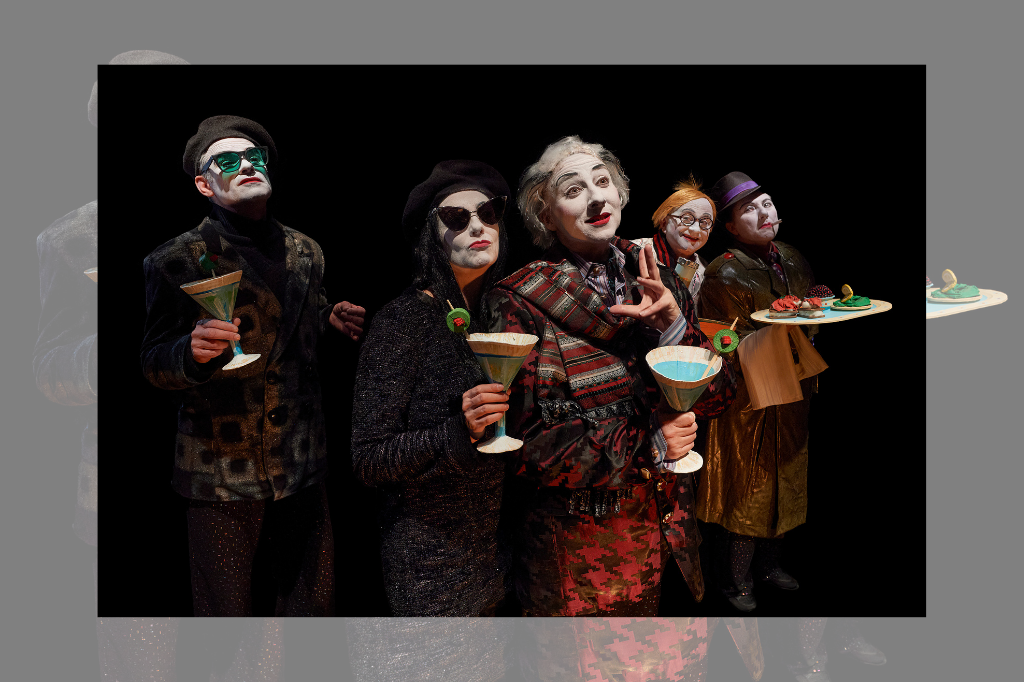REVIEW: The Cold War at VideoCabaret
A tiny playing space and even tinier proscenium. Wacky and wiggy costumes. Music ripped straight from the B-movies of decades past.
The Cold War: Part 1 is VideoCabaret’s first project back since the pandemic, but it’s a journey back in time for the company. Doubly so, actually: as you might have guessed, it’s set squarely in the 1950s, but it’s also a re-mount of a project last produced by VideoCabaret in 1995 under the co-leadership of Deanne Taylor. Taylor passed away in December 2020, and her loss is still keenly felt by members of the company.
Located adjacent to a Value Village parking lot off Queen St E, on an alleyway called Busy Street, VideoCabaret is a strange little venue. The company’s fantastic first installment of The Cold War by Michael Hollingsworth traces fault lines in Canadian politics, politics foregrounded by the influx of mass media just after World War II. Told through snappy vignettes, larger-than-life costumes and props, and endlessly silly accents and acting choices (which beautifully sync up with the show’s beating heart of kitsch), the play recollects Canada’s history of elections, spies, and the country’s treatment of women in the 1950s. Mac Fyfe’s and Michael Hollingsworth’s direction is assured and peppered with just the right amount of whimsy — The Cold War has a strange and spooky aesthetic all its own, somewhere between Wonka and Coraline.
Where The Cold War perhaps falters is in its own estimation of what the play is fundamentally about — program notes and media appearances indicate a focal point populated by 1950s Canadian politics, spearheaded by men in suits gunning for office across the country while simultaneously searching out well-concealed spies.
But the story which emerges most effectively isn’t one of espionage or poll-watching: it’s of the housewives at home. Aurora Browne as Mary Muffet is a lightning rod of energy, and her chemistry with tyrannical husband Tom (Greg Campbell) is endlessly readable and precise. Mary Muffet is a typical housewife until she isn’t — her husband strays and sour feelings fester — and before she knows it she’s a human guinea pig for clinical LSD trials. Muffet’s is the story which most haunts outside the context of the hyper-stylized Cold War: the fight for women’s bodily autonomy is an ancient one, and Muffet’s electroshock therapy, though cartoonish in presentation, stings in a performance context overshadowed by the imminent overturn of Roe v. Wade.
That’s not to say the political fodder isn’t fascinating — it is, though if, like me, you didn’t take a Canadian civics class in high school, you might find yourself doing some Googling on your way home. The Cold War’s ensemble is excellent, and features standout performances from Richard Alan Campbell as Igor Gouzenko/C.D. Howe/Dr. Ewen Cameron and Richard Clarkin as John Diefenbaker.
I must mention the scenographic work which so wonderfully contributes to this exaggerated, hyper-aestheticized world: props, in particular, by Brad, Merle, and Theo Harley are exquisite. A functional, oversized “tape recorder” with real, spinning decks is fantastic, along with huge pencils and cigars. Costumes and makeup design by Astrid Janson and Melanie McNeill are well constructed and designed in tune with the humour of the work — pointily-breasted spy jackets constitute what was one of my favourite sight gags. Lighting by Andrew Dollar is moody and appropriately inspired by film noir. My only quibble with it was the ensemble’s tendency to only half-appear in their light before frantically moving a few centimetres over, indicating mis-taped marks onstage or perhaps inadequate rehearsal time with those uber-precise lighting cues.
(Another small dramaturgical note: the faux Cyrillic font used in The Cold War’s marketing and programs is really annoying if you speak Russian — I do. The sounds suggested by those characters are vastly different between alphabets, and the aesthetic the font offers isn’t compelling enough to mitigate the phonetic disconnect. If you speak both languages, some of The Cold War’s promotional material is a little hard to read.)
The Cold War is a raucous romp through Canadian history and politics — it’s an enjoyable night out, and I’d advise bringing cash for the bar (the comedy of the show lends itself well to libation). Quips and quibbles aside, I thoroughly enjoyed it: ‘twas a lovely first introduction to Toronto’s storied VideoCabaret.
The Cold War runs at VideoCabaret through June 5. Tickets are available here.















Comments